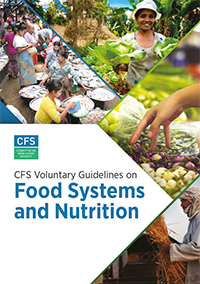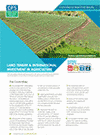CFS Policy Products
Using a multi-stakeholder, inclusive approach, CFS develops and endorses policy recommendations and guidance on a wide range of food security and nutrition topics.
These are developed starting from scientific and evidence-based reports produced by the High-Level Panel of Experts on Food Security and Nutrition (HLPE) and/or through work supported technically by the Food and Agriculture Organization of the United Nations (FAO), The International Fund for Agricultural Development (IFAD), World Food Programme (WFP) and representatives of the CFS Advisory Group.
Major policy products
 |
Voluntary Guidelines on Food Systems and NutritionThe CFS Voluntary Guidelines on Food Systems and Nutrition (VGFSyN) were endorsed at CFS 47 in February 2021. Resulting from a five-year intensive and inclusive multi-stakeholder consultation process and informed by the scientific evidence provided by the CFS High Level Panel of Experts, the Guidelines aim to support countries to eradicate hunger and malnutrition in all its forms by utilizing a food systems lens. |
CFS Policy Recommendations
Promoting Youth Engagement and Employment in Agriculture and Food Systems for Food Security and Nutrition (CFS 50, 2022)
Agroecological and other innovative approaches for sustainable agriculture and food systems that enhance food security and nutrition (CFS 48, 2021)
Sustainable forestry for food security and nutrition (CFS 44, 2017)
CFS Policy Recommendations
 | Policy recommendations | HLPE Report | |
|
With a core focus on the following SDGs: |
With contributions to SDGs: |
|
 | Policy recommendations | HLPE Report | |
|
With a core focus on the following SDGs: |
With contributions to SDGs: |
|
 | Policy recommendations | |
|
With a core focus on the following SDGs: |
With contributions to SDGs: |
|
 | Policy recommendations | HLPE Report | |
|
With a core focus on the following SDGs: |
With contributions to SDGs: |
|
 | Policy recommendations | HLPE Report | |
|
With a core focus on the following SDGs: |
With contributions to SDGs: |
|
 | Policy recommendations | HLPE Report | |
|
With a core focus on the following SDGs: |
With contributions to SDGs: |
|
 | Policy recommendations | HLPE Report | |
|
With a core focus on the following SDGs: |
With contributions to SDGs: |
|
 | Policy recommendations | HLPE Report | |
|
With a core focus on the following SDGs: |
With contributions to SDGs: |
|
 | Policy recommendations | HLPE Report | |
|
With a core focus on the following SDGs: |
With contributions to SDGs: |
|
 | Policy recommendations | HLPE Report | |
|
With a core focus on the following SDGs: |
With contributions to SDGs: |
|
 | Policy recommendations | |
|
With a core focus on the following SDGs: |
With contributions to SDGs: |
|
 | Policy recommendations | |
|
With a core focus on the following SDGs: |
With contributions to SDGs: |
|
 | Policy recommendations | HLPE Report | |
|
With a core focus on the following SDGs: |
With contributions to SDGs: |
|
 | Policy recommendations | HLPE Report | |
|
With a core focus on the following SDGs: |
With contributions to SDGs: |
|








